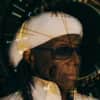Ghana-based Benjamin Lebrave speaks fluent French and English, and can schmooze in Spanish and Portuguese. He’ll report on new African music every other week. This week, in a sort of followup to last time's feature on Art Melody, he introduces another Burkinabé artist, Greg Burkimbila.
Ouagadougou, round 2. This time we look into what is practically the polar opposite of Art Melody: Greg Burkimbila and his catchy, poppy tune "Laafi La Boum Faan."
Download: Greg Burkimbila, "Laafi La Boum Faan"
I discovered this song last December, shortly after deciding to travel to Burkina Faso to meet with Art Melody. I knew close to nothing about Burkinabé music, so I had a go on YouTube to see what some of the more popular videos were. Greg's song stood out: it wasn't coupé-décalé, it had local flare, and… no Auto-Tune! That alone is a big departure from most current African pop. Not that I am opposed to Auto-Tune, but I am opposed to predictable music.
And Greg's music, although in many ways familiar and accessible, sounds different to me. When I hear it I can almost see the melting pot of influences, some of which I had the privilege of experiencing first hand in Ouaga last month. Burkina Faso's music is practically unknown outside of Africa, in comparison to its northwestern neighbor Mali, despite some common sounds. Burkina's music is entirely unknown inside Africa, too, mainly because it is a minuscule market which has not been able to export much. As opposed to, say, Ghana: you'll hear azonto in Ouaga, and people are very much aware of what it is.
Another significant factor is Burkina's strong historical and economical bond with Côte d'Ivoire, where millions of Burkinabé have emigrated throughout recent decades. Culture is quite porous between Abidjan and Ouaga, meaning you hear coupé-décalé all the time in Burkina, some of it made locally, but hardly distinguishable from the Ivorian stuff. In the end Burkina gave me the impression that musically, it was struggling to develop its own identity.
In Burkina, I met a lot of talented musicians. The ones I met who record acoustic music in the studio often try to blend in a lot of different influences, in particular Mandingue and other Malian styles. The ones I heard playing at live music venues usually cover a repertoire of pan-African covers. Many of these musicians were quite good, and I can never say no to any band playing Congolese classics. Still, I hoped to hear more Burkinabé music.
All this to say: I am very impressed with Greg's hit song, "Laafi La Boum Faan." To me it strikes a perfect balance between ancient tradition and global exposure—and it's catchy! Greg wrote the song himself, fusing together the diverse music he grew up listening to: "I've listened to a lot of pop, country music, R&B, African and Burkinabé music. Artists like Georges Ouédraogo, Lokua Kanza, Tracy Lawrence or Craig David inspired me in my writing."
Greg showed an interest in music at a very early age: "in a way my family got me started, since my mom and some of my brothers sang in church choirs. After hearing them for some time, I started humming songs. People around me appreciated my voice and encouraged me to take my singing further." Greg put football aside (an otherwise enormously popular hobby in Burkina!) and picked up a guitar. "I learned to play it almost by myself, and I've used it to write many of the songs on my album."
This casual routine has been shaken up by his recent success. No more classes at the university, his fame and hectic schedule force him to take online courses, and some of his friends are feeling left out from his success. Despite what may seem like a disconnect, Greg harnesses his success to reach out to Burkina's people as much as possible. "Long term, I'd like for Burkina Faso to be known better in the world, and for its music to be listened to everywhere. I wish for people to know we can create wonders. I want to make music which can compete globally, I want to bring the best of me to the biggest stages in this world." Enough said.


